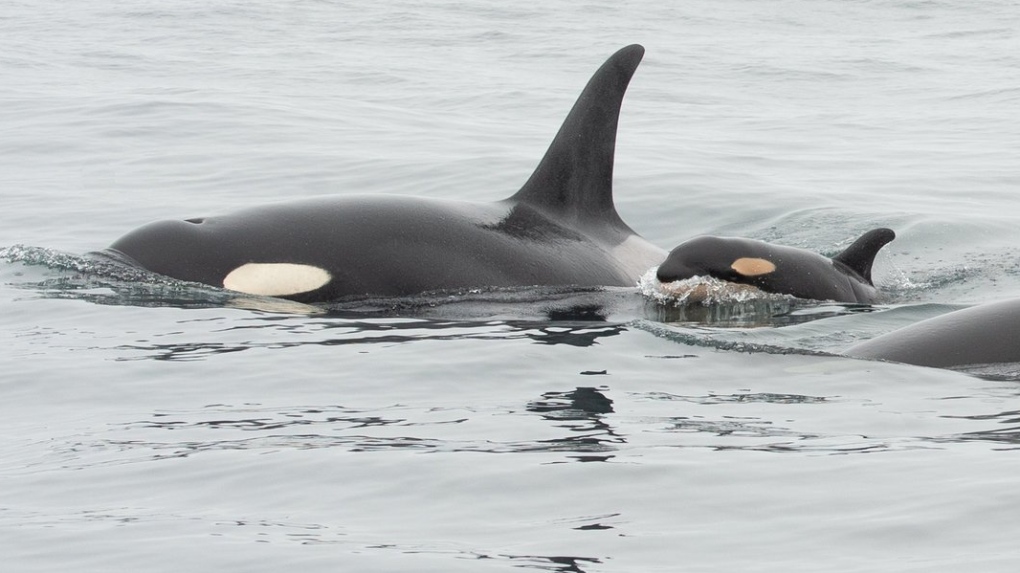
Expanded measures unveiled to protect B.C.'s endangered southern resident killer whales
 A newborn southern resident orca calf is seen swimming alongside its mother. (Source: DFO / John Forde and Jennifer Steven, Tofino Whale Centre)
A newborn southern resident orca calf is seen swimming alongside its mother. (Source: DFO / John Forde and Jennifer Steven, Tofino Whale Centre)
The Vancouver Fraser Port Authority is expanding measures to help protect B.C.'s endangered southern resident killer whale population as part of its Enhancing Cetacean Habitat and Observation program.
In a news release, the country's largest port says the main objective of the ECHO program is to reduce threats to at-risk whales posed by commercial ship traffic.
It encourages ship operators to slow down or stay distanced in critical habitat for southern resident killer whales, in an effort to reduce vessel noise.
This is the program's sixth season of underwater noise reduction initiatives and the port authority says more than 80 marine transportation organizations have agreed to participate in the program to date.
"Over the last six years, the ECHO program has become internationally recognized for implementing one of the world’s largest, and most successful, voluntary efforts to reduce underwater noise from ships,” says Duncan Wilson, vice-president of environment and external affairs.
“We hope to serve as an example, globally, of how collaborative efforts can create quieter oceans for endangered whales.”
This year's noise reduction measures are expected to cover a record-high distance of about 80 nautical miles of the Salish Sea, including at Swiftsure Bank, Haro Strait, Boundary Pass and in the Strait of Juan de Fuca.
The measures will be in effect from June through November, when southern resident killer whale presence is typically at its highest, the port authority says.
In 2022, the ECHO program will also include an expanded ship slowdown trial at Swiftsure Bank, which is a known foraging area for southern resident killer whales that overlaps with international shipping lanes.
"This year, the slowdown extends to the inbound shipping lane, which is the main entry point used by commercial ships to reach the Port of Vancouver. This measure is in addition to Transport Canada’s seasonal slowdown area outside of the shipping lanes," the port authority says.
The port authority adds that since 2017, the ECHO program has helped reduce underwater sounds by up to 55 per cent in crucial killer whale foraging areas.
"Underwater noise is one of the key threats to southern resident killer whales due to its potential to interfere with their ability to hunt, navigate and communicate," it says.
CTVNews.ca Top Stories

Pedestrian, baby injured after stroller struck and dragged by vehicle in Squamish, B.C.
Police say a baby and a pedestrian suffered non-life-threatening injuries after a vehicle struck a baby stroller and dragged it for two blocks before stopping in Squamish, B.C.
Senate expenses climbed to $7.2 million in 2023, up nearly 30%
Senators in Canada claimed $7.2 million in expenses in 2023, a nearly 30 per cent increase over the previous year.
Demonstrators kicked out of Ontario legislature for disruption after failed keffiyeh vote
A group of demonstrators were kicked out of the legislature after a second NDP motion calling for unanimous consent to reverse a ban on the keffiyeh failed to pass.
Tom Mulcair: Park littered with trash after 'pilot project' is perfect symbol of Trudeau governance
Former NDP leader Tom Mulcair says that what's happening now in a trash-littered federal park in Quebec is a perfect metaphor for how the Trudeau government runs things.
RCMP uncovers alleged plot by 2 Montreal men to illegally sell drones, equipment to Libya
The RCMP says it has uncovered a plot by two men in Montreal to sell Chinese drones and military equipment to Libya illegally.
Government agrees to US$138.7M settlement over FBI's botching of Larry Nassar assault allegations
The U.S. Justice Department announced a US$138.7 million settlement Tuesday with more than 100 people who accused the FBI of grossly mishandling allegations of sexual assault against Larry Nassar in 2015 and 2016, a critical time gap that allowed the sports doctor to continue to prey on victims before his arrest.
BREAKING Canucks goalie Thatcher Demko won't play in Game 2
The Vancouver Canucks will be without all-star goalie Thatcher Demko when they face the Nashville Predators in Game 2 of their first-round playoff series.
Man wanted in connection with deadly shooting in Toronto tops list of most wanted fugitives in Canada
A 35-year-old man wanted in connection with the murder of Toronto resident 29-year-old Sharmar Powell-Flowers nine months ago has topped the list of the BOLO program’s 25 most wanted fugitives across Canada, police announced Tuesday.
Doctors ask Liberal government to reconsider capital gains tax change
The Canadian Medical Association is asking the federal government to reconsider its proposed changes to capital gains taxation, arguing it will affect doctors' retirement savings.






























